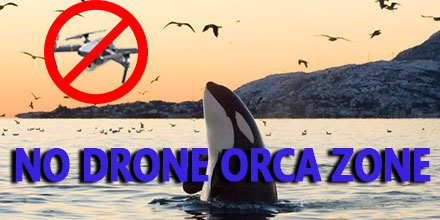No Drone Orca Zone
New legislation in Washington State aims to protect some special residents
 Legislation introduced in the state of Washington aims to limit drone interference for some very special residents…an endangered population of Orcas.
Legislation introduced in the state of Washington aims to limit drone interference for some very special residents…an endangered population of Orcas.
These Orcas, also known as the southern resident killer whales, are the smallest of four resident communities within the area. It is the only killer whale population listed as endangered by the U.S. Fish & Wildlife Service. In addition, they are protected under the Endangered Species Act.
The proposed bill requires drone operators to maintain a 200-yard buffer, in all directions, from any southern resident killer whales. This buffer already applies to boats, vessels and other objects that might encroach on the animals.
However, the existing law was unclear as to whether or not the line other objects applied to drones and other sUAS.
Legislators aim to eliminate confusion
In 2015, a drone operator in San Juan County was fined $1,025 for flying too close to the southern resident killer whales. Consequently, the drone operator’s attorney argued that the word “object” was not specific enough to cover drones. The attorney’s arguments succeeded and the fine was dismissed.
After the dismissal, San Juan County Prosecutor, Randall Gaylord, recommended changing the existing law to include specific language about drones.
The change would help bring clarity for all involved – prosecutors, law enforcement officials and drone operators.
However, clarity is simply a by-product of the legislation.
No Drone Orca Zone original intent
According to State Rep. Kris Lytton, D- Anacortes, her primary motivation for introducing the bill was to address growing concerns from area residents.
The southern resident killer whales are a popular attraction. Each year, thousands travel to the area in the hopes of catching a glimpse…including drone operators. As a result, the number of people launching drones from boats to view the whales has increased. Which, in turn, has raised concern from residents.
“I think it is reasonable that drones should have the same parameters as whale-watching vessels or private vessels,” said Lytton.
Though drones seem a less invasive option to monitor and photograph orcas, it is still not clear how this technology impacts the whales. Until that impact is clear, the no drone orca zone aims to hold drone operators to the same standards as other vessels operating near and around these killer whales.

